It’s been a couple weeks, so by now you’ve probably read (or heard) a few takes on Jordan Peele’s latest pop-culture sensation, US. However, even with all of the solid, classist, socioeconomic readings out there, it needs to be said that most of them are missing the point. As Peele himself has said, “There’s a double meaning to everything… This movie’s about duality.” Even so, a lot of people have been left scratching their heads over the film’s bizarre imagery and admittedly illogical worldbuilding. This isn’t meant as a critique of US or anyone else’s interpretation of the film, but rather as an examination of Peele’s use of symbolism and what it might all mean with respect to the film’s greater themes.
The most obvious bit of symbolism is a reference to Jeremiah 11:11, which reads, “Therefore thus saith the LORD, Behold, I will bring evil upon them, which they shall not be able to escape; and though they shall cry unto me, I will not hearken unto them.” This “evil,” as already covered by several other publications, can be interpreted as either the Tethered descending (err, ascending) upon surface-dwelling humanity, or the pain and misery they must endure without meaning or context and no way to stop it. Well, it is this author’s opinion that Jeremiah 11:11 is more of a, say, happy coincidence than a real clue to the film’s themes. It is through another, totally legit belief system that 1111 really takes on meaning.
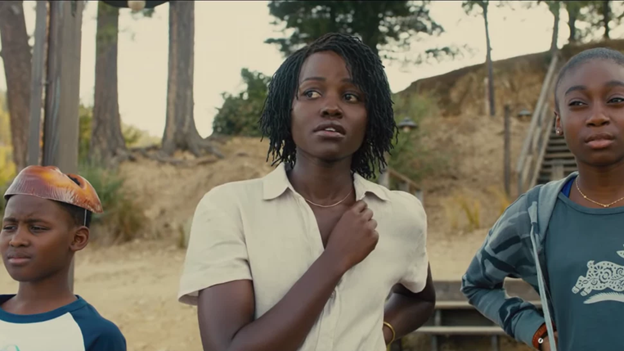
Where’s he going with this?
In numerology, 1111 is essentially shorthand for “synchronicity,” a term coined by Swiss psychoanalyst Carl Jung, defined as “meaningful coincidence” and “acausal parallelism.” 1111 is seen as a gateway number, and one’s awareness of it (it appearing more and more frequently) occurs as the universe begins to acknowledge that person in kind, signifying a transition into a new phase in life—usually accompanied by some major, often trying, changes—where one’s thoughts are given power to become reality. This is why people say to make a wish at 11:11.
We see this play out everywhere as Adelaide wanders away from her father before meeting her double in 1986, and again in the present day when she returns to Santa Cruz with her family as an adult. In 1986, as Adelaide wanders the boardwalk, the camera seems to pay an odd amount of attention to several seated, eating couples, indicating her noticing of them. Seconds later, she (we) sees another couple that keeps tying in rock-paper-scissors. Then we see a homeless man with a sign reading “Jeremiah 11:11.” It’s a rapid succession of mirror imagery (11:11 itself a mirror image) that all occurs right before she enters—what else—a hall of mirrors.
Peele hammers us with even more mirror/numerological imagery in the present. There are the Tyler family twins, one of whom wears a Black Flag shirt, calling to mind the Black Flag-shirt-clad whack-a-mole carnie in 1986, thus creating another mirrored pair and another visual signifier of 1111, as the band’s logo (four black bars) looks like IIII. Later, after a clock displaying 11:11 is shown, the Wilson doppelgängers arrive, standing side-by-side in the driveway, which can be seen as yet another visual representation of 1111.
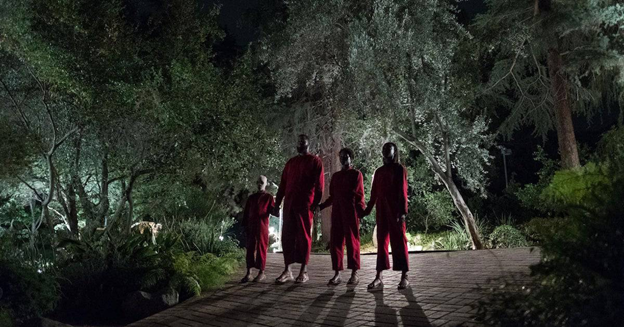
1111
Coming back down to Earth, some of the more prominent aspects of the film exhibit a double meaning. US makes expert use of not one, but two versions of the song “I Got 5 on It,” a song which, on the surface, is about someone kicking $5 towards a dime bag, but, more figuratively, is about two people contributing two halves to a whole. And then there are the scissors. The scissors are particularly special in that they are both a single, functional unit formed by two, opposing halves, and a tool used specifically for severing things. Great, so, what does all this hoopajoop mean? Let’s just say it’s no coincidence that synchronicity is attributed to Jung.
If we first look at the Tethered not as a representation of social inequality (which they totally can be, don’t get me wrong), but from a psychological perspective, we can understand them as Id manifestations. The Tethered are: primal, animalistic; generally incapable of articulating, communicating mainly by grunting and screaming; unwilling to listen to reason; and given to irrational, violent impulses. They are, in a word, underdeveloped. In Jungian psychoanalysis, the Id is synonymous with his concept of “the shadow,” which is all of the hidden, unconscious, and underdeveloped aspects, whether good or bad (though typically viewed as negative), an individual has repressed or simply doesn’t recognize. This might be why the Wilson family doesn’t realize the doubles are themselves right away even though it is immediately apparent to us as viewers.
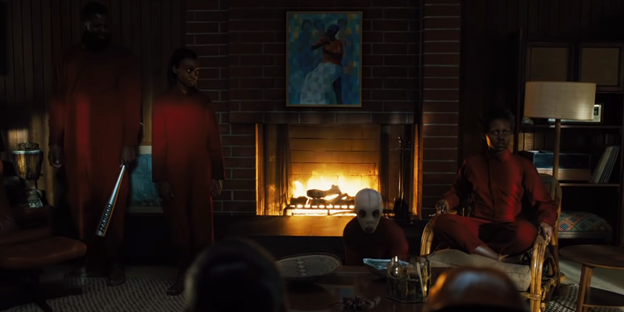
Their doubles, in shadow
Here Peele’s “double meaning” comes into play in a big way. The Tethered, as the unseen, overlooked, ignored, not-even-aware-of shadow, correspond to those same segments of society: the homeless (man on boardwalk), minorities (the handful of black and brown rabbits sprinkled in with the majority white), and those within the prison-industrial complex (the underground facility, the red jumpsuits). Also worth noting is the role literal shadows play in the film, stressing their thematic importance. The word shadow is spoken at one point, and several scenes clearly focus on shadows, such as the overhead shot of the Wilson family walking down the beach, or Red hiding in the shadow of a car before abducting Jason.
Opposed to the shadow is the persona, which Jung defines as “a kind of mask, designed on the one hand to make a definite impression upon others, and on the other to conceal the true nature of the individual.” One’s persona is what one presents to the world; it’s who we want to be, not necessarily who we are. The word persona, in Latin, translates to “mask,” as in what Jason wears. Sure, it’s a tongue-in-cheek reference to Jason Voorhees, but, like everything else in the film, it has a second, deeper meaning. In psychology, “masking” refers to hiding one’s emotions, especially those seen as socially unacceptable, in order to better fit in with society. Jason happens to display some pretty socially unacceptable traits: he swears at the dinner table, scares his sister, and, oh yeah, he might be a firebug. Another way to put it is that masking is putting up a facade to hide an uglier truth. Think of Pluto’s burnt face, Kitty’s facelift, or the entire Tyler family who, despite keeping appearances as the proverbial Joneses, all despise each other.
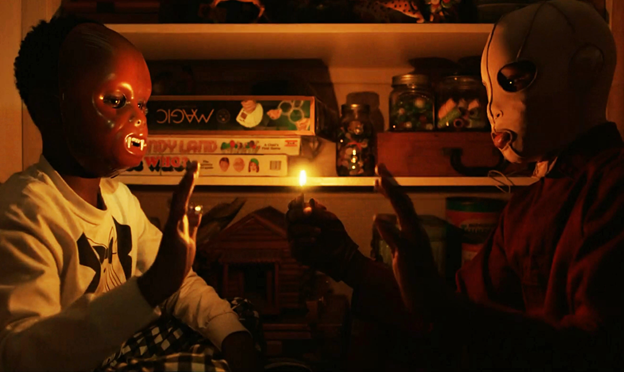
Who’s Who?
The unconscious self (the shadow), as an internal force, seeks expression in the external world—to take off the mask, in a sense. As Jung put it, “everything in the unconscious seeks outward manifestation.” The Tethered wanted to be free, so—possibly through divine happenstance, “God,” as Red suggests—they found a way to the outside world where they confront their surface-dwelling counterparts who (unknowingly) have kept them locked in torment. As Jung noted, “confrontation with the shadow produces at first a dead balance, a standstill that hampers moral decisions and makes convictions ineffective or even impossible.” We see this happen to the Wilsons who, addled by this unthinkable horror, fail to fight off or escape their doubles.
However, Jung didn’t see the shadow as purely negative, and neither does Peele, which is key to understanding the film. Jung saw the unconscious as a well of untapped potential, where all of the things a person is capable of are hidden away. Wasn’t it kind of weird how “Adelaide” realized her dancing talent after she joined the Wilson family in the outside world? Or was that just a comment on access to resources and the impact of one’s environment on development? A final thought before I get too into the weeds, where a double may represent the shadow or personal unconscious of a given individual, the shot of the Tethered joined hand-in-hand across the country, while an intentional mirror of Hands Across America, may also represent Jung’s concept of the collective unconscious.
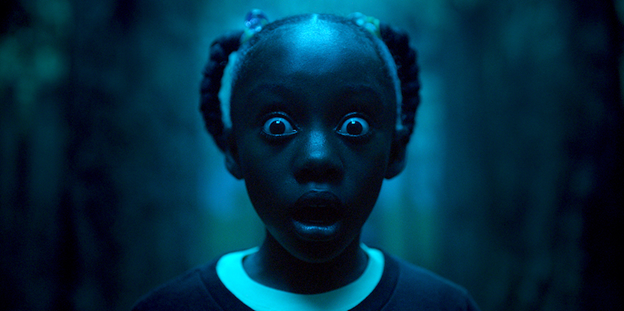
Mind blown
Okay, I get all the Jung, shadow/Tethered stuff, but what about the film’s stranger elements?
US opens on two seemingly pointless bits of information, an ad for Hands Across America and an intertitle explaining that the United States are crisscrossed by unused tunnels with no known purpose. Since everything in US has a double meaning, it stands to reason that these do, too. And since that’s the case, why are the Tethered called that, anyway? Well, “tethering” refers to using a phone or similar device as a modem or router so that another device can access the internet—a connection between two devices. How does a device access the internet to begin with? By connecting to any of the miles and miles of subterranean fiber optic cables running across the U.S. How did the Tethered connect to the outside world? By establishing a connection with Adelaide.
Hands Across America had a second meaning, too. The benefit wasn’t just a publicity stunt meant to raise awareness for hunger (an interesting maybe-parallel here being the Tethered only ate rabbit, which can lead to a form of malnutrition called protein poisoning, aka “rabbit starvation”), but to demonstrate how great it would be if we were all to come together—to be connected—if only for 15 minutes. Peele contrasts this with the present day where that idea has been realized—in the form of the internet. The internet has linked us all, but, instead of bringing us together and making the world a better place, it has created an ectype unreality—a distorted mirror of the real world.
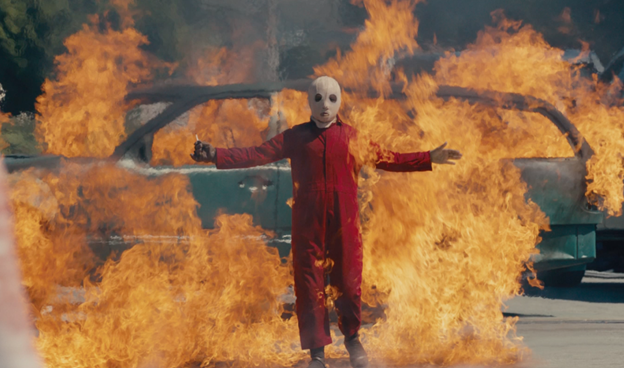
Catch me in the comment section
The internet and especially social media has expanded our idea of identity to include online identities. Instead of the persona and shadow of the self, we now have a—I don’t know—hyper-persona, too. Today, we have the ability to present ourselves exactly how we want to be seen, to dress up our lives to make them look better than they really are. There’s the Tyler family again, but all I really have to say is Instagram. On the flipside of this, the anonymity of the internet allows us to let our worst, most antisocial tendencies—like the Tethered—to run wild. Think YouTube comments. Think 4chan.
If the Tethered reflect a distorted version of ourselves, so do our online identities—one a mirror we want to look into, one we don’t. In US, Peele is holding that second mirror to us. He is saying we have become tethered to how we want others to see us at the expense of who we really are; that we have become out of touch; cut off from the real world, from each other, from ourselves. When Red tells Adelaide the Tethered had to make a statement, this is it: We have been locked down in the Cave for too long; what we have come to think is reality, isn’t. Thus, mirroring the film, is the image of the Tethered joined hand-in-hand across America, in the full light of the real world.
No idea what’s with the gloves, though!



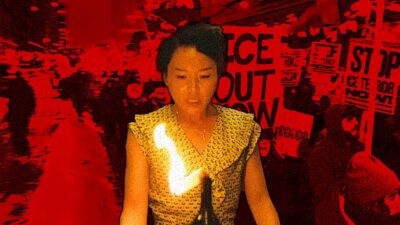
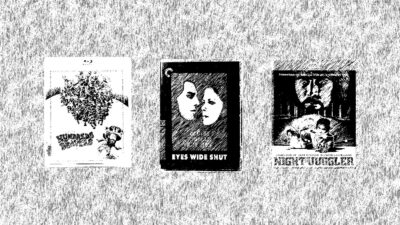
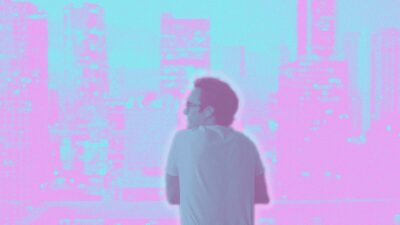
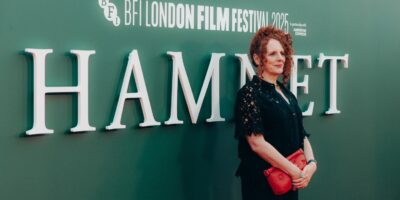

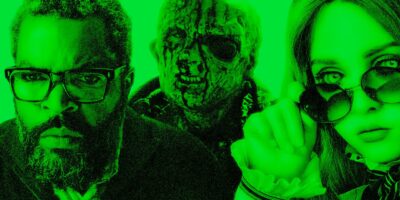

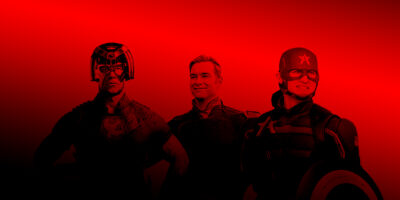
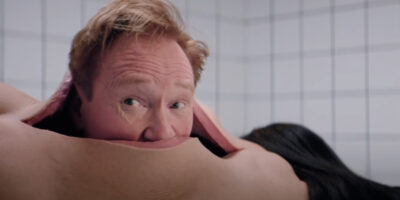




Comments